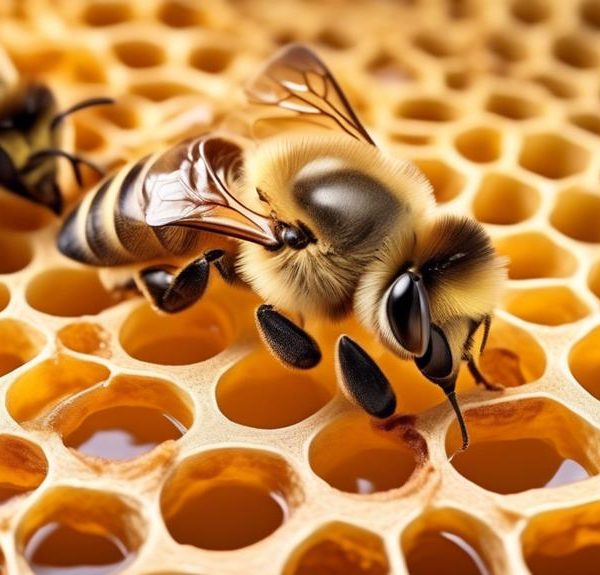Dive into the intriguing world of skincare as we unravel the truth about beeswax's comedogenic properties – will it clog your pores or not?

Is Beeswax Comedogenic?
Imagine you're a sailor navigating the vast skincare ocean, where each ingredient is an island with its own unique landscape.
You come across Beeswax Island, known for its beneficial properties, but you've heard whispers of it being comedogenic, potentially blocking your skin's pores. This island is not as straightforward as it seems.
You're left wondering, should you drop anchor and explore, or is it safer to continue your journey? The answer lies in understanding the nature of beeswax in skincare.
Let's set sail together to uncover the truth.
Key Takeaways
- Beeswax is a natural substance that is non-comedogenic and safe for all skin types.
- It has emollient properties that soften and rehydrate the skin while providing a protective barrier.
- Skincare products that contain beeswax can help hydrate, soften, and protect the skin.
- Beeswax has a comedogenic rating of 2, indicating a minor possibility of pore-clogging but generally safe for most skin types.
Understanding Comedogenic Ingredients
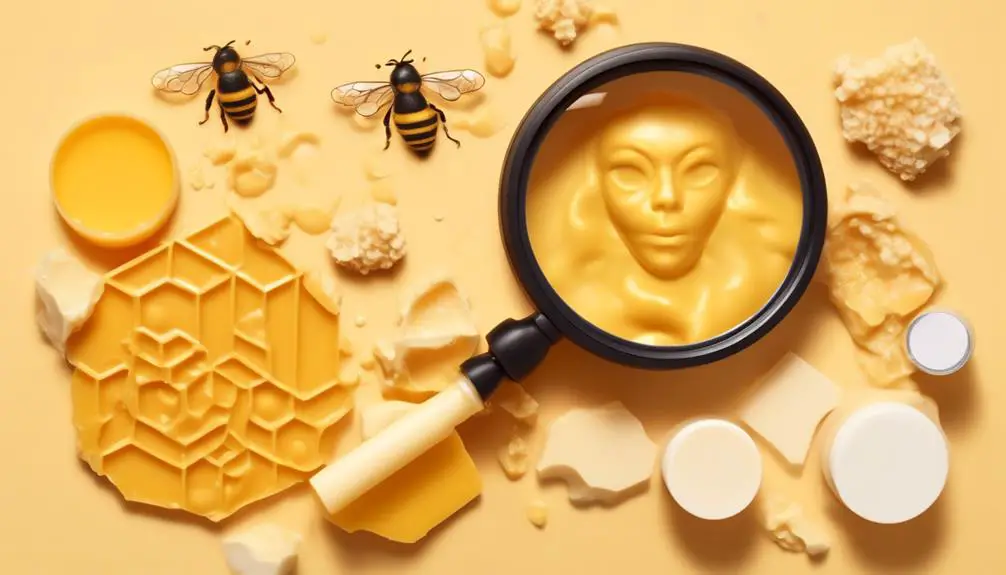
Before diving into the specifics of beeswax, it's important that you grasp the concept of comedogenic ingredients, which are substances known to clog pores and potentially lead to skin issues like acne. These pesky offenders can be found in many beauty products, from make-up to skincare. Cosmetics often contain oils and waxes, and while they're not all bad, some can cause problems for certain skin types.
Comedogenicity is measured on a scale of 0 to 5, with 0 being non-comedogenic and 5 being highly comedogenic. This scale reveals the likelihood of an ingredient to clog pores. It's not an exact science, but it provides a guideline. The higher the comedogenic rating, the more likely you're to experience blocked pores from that ingredient. Remember, though, everyone's skin is unique. What clogs one person's pores may not affect another's.
Understanding comedogenic ingredients is crucial in managing your skin health. It's about knowing what you're putting on your face and how it might impact your skin. Armed with this knowledge, you're prepared to make informed decisions about the products you use, including beeswax.
The Nature of Beeswax
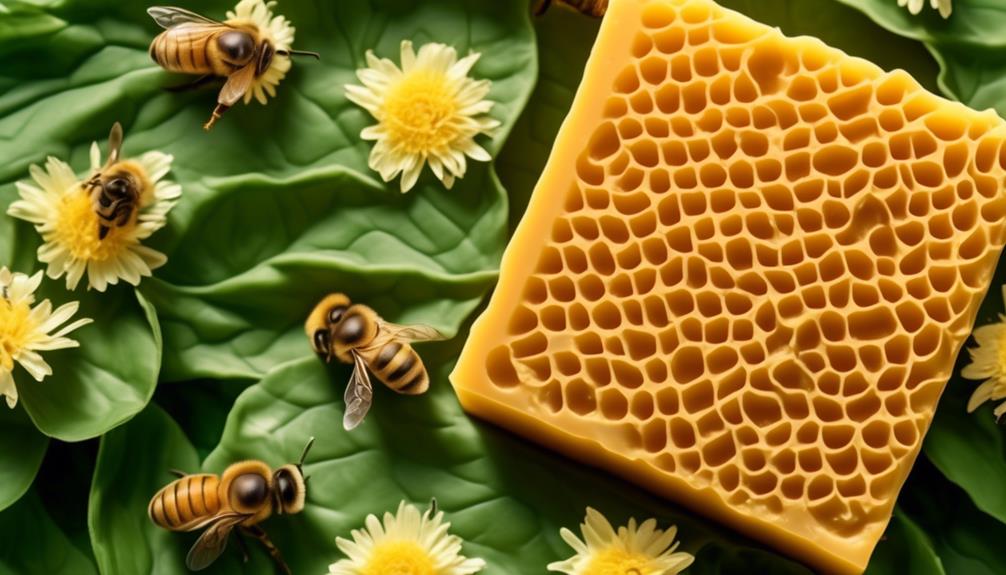
Diving into the world of beeswax, it's crucial to understand its nature and how it interacts with your skin. Beeswax is a natural substance, produced by bees to construct their hives. It's rich in vitamin A, which plays a vital role in skin development.
Unlike some natural components, beeswax doesn't clog pores. It's non-comedogenic, meaning it won't cause blackheads or whiteheads. It's typically safe for all skin types and rarely causes allergic reactions.
Beeswax also has emollient properties, meaning it softens and rehydrates the skin while providing a protective layer against environmental damage. It's these qualities that make beeswax a popular ingredient in skincare products, ranging from lip balms to moisturizers.
However, the effectiveness of beeswax may vary depending on how it's processed. Unfortunately, some companies refine beeswax to the point where it loses its beneficial properties. Therefore, it's important to buy products made with unrefined, natural beeswax.
Beeswax in Skincare Products
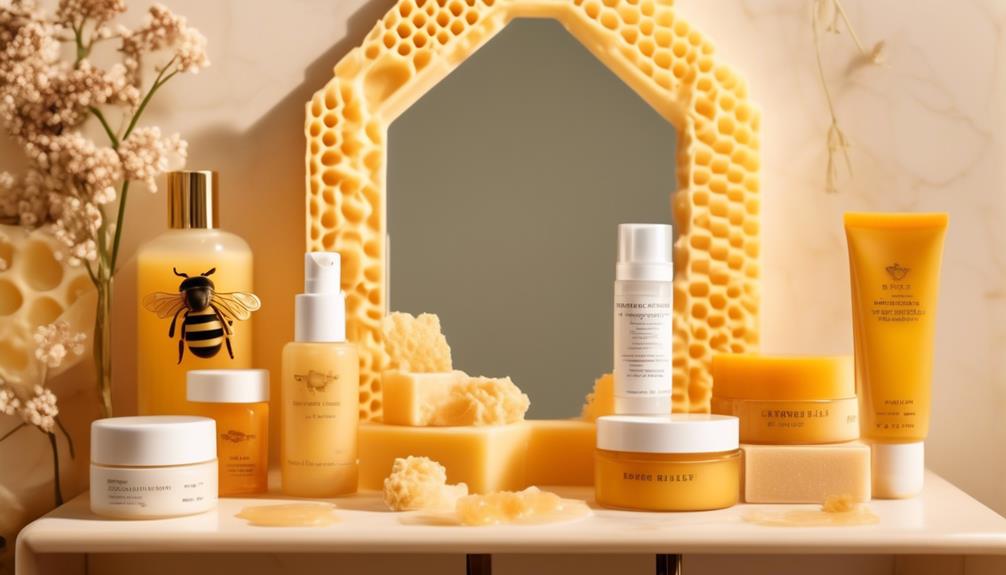
Harnessing the power of beeswax, many skincare brands incorporate this natural ingredient into their formulas, boosting the product's ability to hydrate, soften, and protect your skin. This waxy substance, produced by bees, is a powerhouse of beneficial properties. It's a natural emollient, meaning it locks in moisture and creates a protective barrier on your skin.
Beeswax's properties don't stop there. It's also non-comedogenic. Now, you might ask, what does that mean? Well, a comedogenic substance is one that can clog pores and potentially lead to acne. Beeswax, on the other hand, won't clog your pores, making it a safe bet for those of you with acne-prone or sensitive skin.
Moreover, beeswax contains vitamin A, which helps with cell reconstruction, and anti-inflammatory properties that can soothe irritated skin. It's often found in products such as lip balms, lotions, and creams.
However, remember that while beeswax is generally safe for most skin types, it's always a good idea to patch test new products. This ensures that your skin won't react adversely to them. So, go ahead, enjoy the benefits of beeswax in your skincare routine.
Analyzing Beeswax Comedogenic Rating
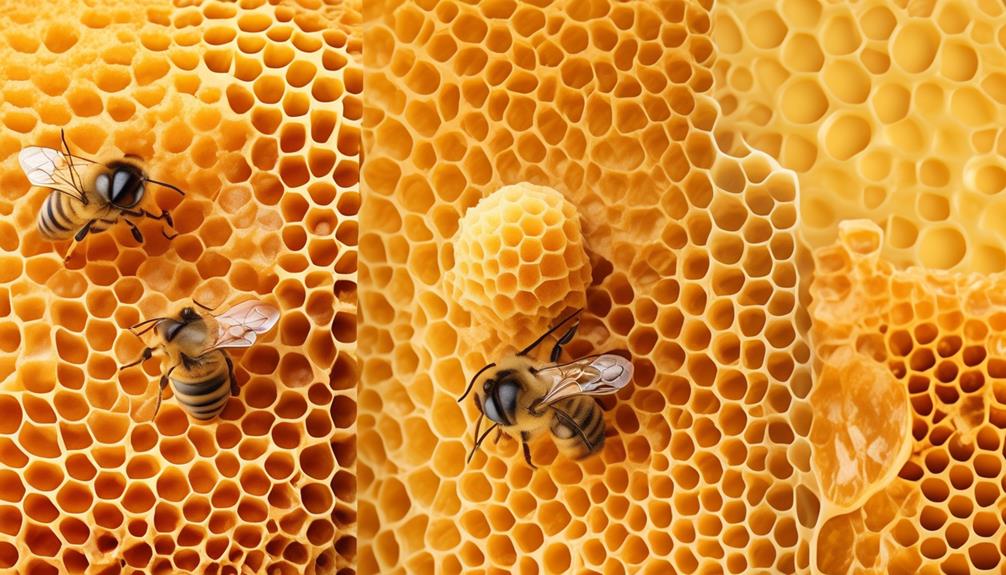
To fully appreciate the non-comedogenic nature of beeswax, it's vital to understand its comedogenic rating. The comedogenic scale ranges from 0 to 5, where 0 indicates that a substance won't clog pores and 5 signifies a high likelihood of causing comedones or acne.
Beeswax has a comedogenic rating of 2, which is generally considered low. This means it's unlikely to block your pores when used in skincare products. While it's not entirely non-comedogenic (rated 0), its lower rating indicates a minor possibility of pore-clogging but it's still considered safe for most skin types.
Yet, it's essential to remember that everyone's skin is unique and responses can vary. For instance, if you have acne-prone or sensitive skin, you might be more susceptible to comedogenic substances, even those with lower ratings. So, while beeswax is generally safe, it's best to patch test any new product before applying it all over your face.
Alternatives to Beeswax in Skincare
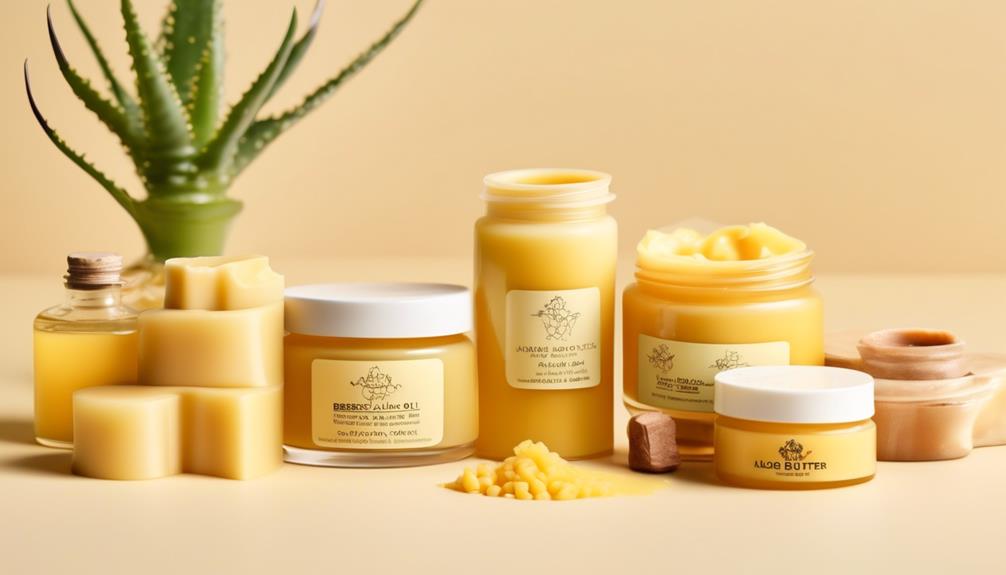
While beeswax is generally safe for most skin types, there are alternatives you might consider if you're particularly sensitive to comedogenic substances. One such alternative is shea butter. It's non-comedogenic, meaning it won't clog your pores, and it's packed with vitamins A and E, which are great for skin health.
Another option is mango butter. It's similar to shea butter in its benefits, but it's slightly lighter and absorbs more quickly into the skin. If you're worried about a greasy residue, mango butter might be the choice for you.
If you're looking for the wax-like consistency of beeswax, you might consider candelilla wax. It's plant-based and vegan, and it's a common substitute for beeswax in many skincare products. Just like beeswax, it helps to form a protective barrier on the skin, but it's less likely to cause breakouts.
Frequently Asked Questions
Are There Any Possible Allergic Reactions to Beeswax in Skincare Products?
Yes, there can be allergic reactions to beeswax in skincare products.
You might experience redness, swelling, itching, or hives.
It's rare, but some people can have a severe allergic reaction known as anaphylaxis.
If you're new to using beeswax products, it's wise to do a patch test on a small area of skin first.
If you notice any adverse reactions, discontinue use and consult with a healthcare professional.
How Is Beeswax Sourced and Is It Eco-Friendly?
Absolutely, beeswax is eco-friendly. It's sourced directly from beekeepers who manage hives. When bees produce honey, they create beeswax to cap the honeycombs. Beekeepers carefully remove these caps, ensuring the hive's sustainability. This process doesn't harm bees or the environment.
Plus, beeswax production actually supports bee populations. So, you're not just choosing a great skincare ingredient, you're also contributing to a healthier planet when you opt for beeswax-based products.
Can Beeswax Be Used in Skincare Products for All Types of Skin?
Yes, you can use beeswax in skincare products for all skin types. It's a natural emollient that helps soften and rehydrate skin. It doesn't clog pores or cause acne, making it suitable even for oily and acne-prone skin.
Beeswax also contains vitamin A, which promotes cell regeneration. However, if you're allergic to honey or other bee products, you'll want to do a patch test first, as you might also be allergic to beeswax.
Are There Skincare Products That Use Beeswax as the Main Ingredient?
Yes, there are numerous skincare products that heavily feature beeswax as a primary ingredient. You'll find it in lip balms, lotions, and creams, among others. Its thick, waxy consistency works wonders in sealing moisture in the skin and forming a protective barrier.
However, it's key to remember that individual skin reactions may vary, and it's always a good idea to patch test new products.
What Is the Process of Incorporating Beeswax Into Skincare Products?
When you're incorporating beeswax into skincare products, you're essentially melting it down and blending it with oils and other ingredients. Start by gently heating the beeswax until it's liquid.
Then, you'll mix it with your chosen oils. It's important to stir the mixture constantly to ensure a smooth consistency.
Once it's cooled, you've got a natural, moisturizing base for balms, creams, or lotions.
Conclusion
In conclusion, it's clear that beeswax isn't comedogenic. Despite its dense nature, it doesn't clog pores or lead to breakouts. Instead, it's a valuable ingredient in skincare, offering hydration and protection.
However, if you're still wary, there are alternatives available. Remember, understanding the nature of the ingredients in your skincare products is key to keeping your skin healthy and happy.

